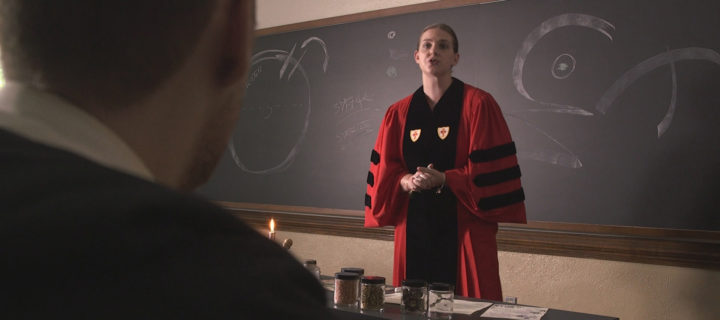Creating Play in the Magical Classroom is a multi-part guide to playing a teacher at the College of Wizardry and New World Magischola larps. While it was written specifically with these events in mind, it can be applied to many other larps and settings.
The texts in this series are written collectively by (in alphabetical order) Maury Brown, Stefan Deutsch, Johanna Koljonen, Eevi Korhonen, Ben Morrow, Juhana Pettersson, Maria Pettersson, Mike Pohjola, Staffan Rosenberg and Jaakko Stenros. The series is edited by Johanna Koljonen.
Part IV: Professor Personalities
Being a Fun Professor Without Playing It All for Laughs
Magic school professors are inevitably strong characters. Whatever they are, they are to the extreme. Super wise, or bitter, or dotty, or eccentric. Actually, most of you can be eccentric, that just adds to the game.
Here are some questions to round out your character:
- What is your character like in class vs. out of class?
- Do they enjoy teaching? Like students? Why?
- What are their pet peeves, their bitter disappointments?
- If they are super controlled in class, what is something you can build in that will allow you to show another side of the character?
- What is their attitude toward house points? Are they generous or stingy with them? Do they give positive points or mainly take them away for infractions?
- Do they have a favorite house or branch of knowledge?
- What sort of students do they favor, if any? Do they downplay or do they relish in this favoritism?
- Also, what kinds of emotions do you want for the professor to inspire in the students?
- What kinds of interactions would create the most interesting play for them – and you?
- Will you offer to explain their dreams and other omens to them?
- Will you ask them to assist you on a research project?
- Will you invite a few people from each of your classes to a secret society? (Remember that secret society meetings should be designed just as much as classes are; this is true even if they are mostly social events – always ask yourself “what can we create together in this group that makes the experience of the larp richer?”)
Playing a Strict or Evil Professor
A magic school should have all kinds of teachers. Many of them are supportive, encouraging and wise role models. But at least a few should be strict and of dubious morals, who may even base their pedagogy on fear and terror. It can be a lot of fun to play at being terrified and being reprimanded, as that is such a big part of fictional magic schools.
Note: some players may be triggered by abusive play, especially from authority figures, so please save the really harsh stuff for those you have agreed to play that way with ahead of time. All play should be opt-in, because when a player (not the character) is genuinely afraid, they can lose the ability to opt out.
Practical tricks on how to play a terrifying professor:
- Start a class by making everyone stand up. Wait a moment before letting them sit (as it establishes authority).
- Expect punctuality, berate students who are tardy.
- Hand out too much homework. (But demand that it is turned in “in five days” so that players need not actually complete it if they do not want to.)
- Pick a name for your character that is impossible to pronouce, have the class practice the pronunciation (but not long enough for the class to learn it), then deduct points if someone mispronounces it. (“How can you understand someone’s ideas if you cannot even pronounce their name?”)
- Don’t smile, glare a lot, keep pregnant pauses.
- Keep your voice steady, never shout. When you want to emphasise something force the students to really pay attention by whispering your words.
- Never use your wand. Build up expectations, but know that whatever the students have envisioned, you’ll never be able to top in game. Keep them guessing. (This is most efficient if only one teacher does it).
- Place students in danger (obviously NOT the players), for example by having the student practice dangerous, illegal magic on each other. Remember to do this in a way that ensures that players can easily opt out without losing face if they don’t like the emotional content of the scene – for instance, you can ask for volunteers to take notes, observe and evaluate, or even construct a reason for students to choose to leave. If a player chooses to leave a class, never shame them or threaten them or gossip about them, in or out-of-character.
- Discuss key events in history from the point of view of the “bad guys” and explain how history is written by the victors and how the “good guys” in power have done terrible things that have been hushed up. (“In this school we pride ourselves in looking at the world as it is, not as we wish it was. Your education thus far has been rife with propaganda. However, I vow to tell you what the world is like — even when the knowledge is deemed “dangerous”, “blasphemous”, or even “treasonous”.)
- Have enough redeeming qualities. Maybe hint at lost innocence or a tragedy hard not to empathise with? Be fiercely devoted to your students, or maybe the protection of the school? Interesting villains are always multi-faceted. Perhaps your character is very strict until students get them started on that one topic they love, when they will suddenly spill all the dirt about their past or share magical stuff that is “really not for the undergraduate level”.
Here are some anecdotes from teacher players about expressing their personality:
“It’s fun to have very strong opinions on some things. My character for example despised Avalon school of magic. (I picked Avalon because I could remember the name.)
So I would constantly go:
“By now you should be able to cast some memory altering spells, change a person’s mood a little and boost your mental abilities. Except for those who graduated Avalon, they can barely spell their own name.”
“I’m only joking of course. I went to Avalon myself. Once. Those are the two hours of my life I’ll never get back.”
Etc etc. I was later told that it was fun especially for those who had indeed graduated from Avalon.” (Maria Pettersson)
“Ridiculous hatred is the best
My hate was directed towards a specific way to hold a wand I called “The Farmer’s Fist”. Everytime I saw someone doing it, I deducted points and said: “You’re a witch, not a farmer! Act like one!”” (Juhana Pettersson)
“I was really good at reading minds, right? So if I wanted to play somebody up I just did this.
- Me: “Who created the Fides Completum spell?”
- *silence*
- Me: “Yes, Miss Seel, that is absolutely correct. One point to house Faust.”
- The class: “But she didn’t say anything!”
- Me: “Is that so? Didn’t you say it out loud, Miss Seel?”
- Miss Seel: “No…”
- Me: “Oh, my apologies. So, as Miss Seel here was THINKING, the spell was indeed created by Isobel Gowdie in 1658.”
I was a mostly logical, precise and demanding teacher in the classroom, but responded to most situations outside class with either direct and snobbish judgement or positive enthusiasm. I was enthusiastic about 90% of the time when students came to me with problems. Everything that happened was WONDERFULLY interesting, or ABSOLUTELY delightful, and if student had any ideas about a solution to their problem I would very earnestly tell them that was a great idea. If they asked for immediate assistance, I’d either tell them in a blithely optimistic way that it was clearly not needed, or if it was (like some kind of actual battle with enemies outside) just be so incredibly inefficient about gathering other teachers and so on that the students had to agree to go on ahead and we’d catch up. I don’t enjoy playing battles anyway, and the best feeling is to arrive too late at a fight, patch up broken students, while listening to their jubilant war stories about how they beat the monster with just a group of JUNIORS at hand.
This work is distributed under a CC BY-NC-ND 4.0 license. That means you are allowed to use elements of this text beyond the extent of referring and linking to it as long as you credit the original authors and source. It’s not allowed to use parts of this work for commercial purposes, if you are unsure if this applies to your project, please contact us.
This is not intended as a cut and paste smorgasbord but rather a complete text. Please reference it, but avoid using parts out of context. It’s better to just link the articles where it’s appropriate for use.






